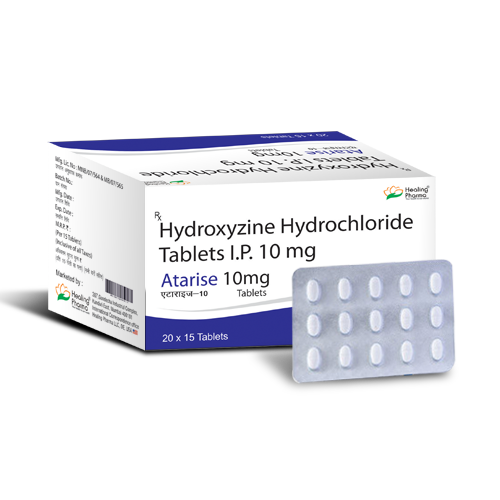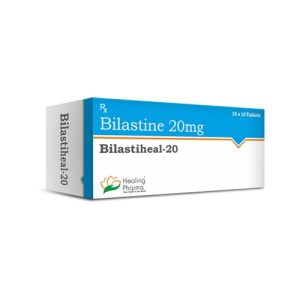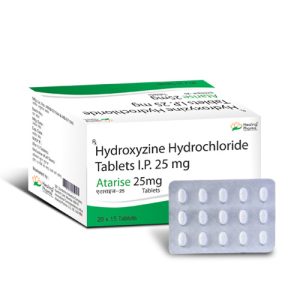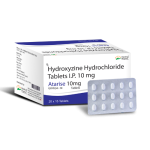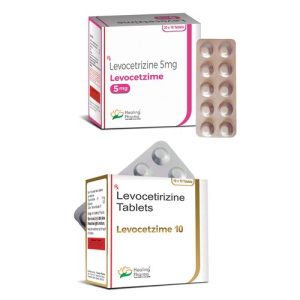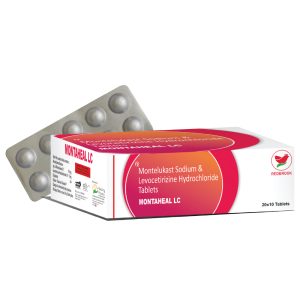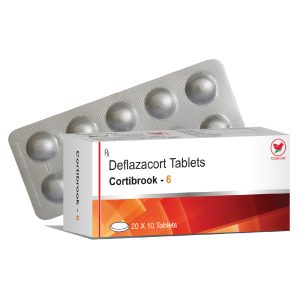Hydroxyzine (Atarise 10) 10 mg tablet is a first-generation histamine H1-receptor antagonist that exhibits sedative, anxiolytic, and antiemetic properties. It helps relieve itch in allergic skin conditions, such as hives (raised red swellings) and eczema. It is also used to treat short-term anxiety in adults and facilitate sleep, and also prevents vomiting, motion sickness, and apprehension or anxiety before surgery.
Drug = Hydroxyzine
Number of Pills Per Order = 15
Strength = 10 mg
Manufacturer = Healing Pharma
How To Take
This medicine can be taken with or without food. Try to make it at the same time each day.
You may stop taking Hydroxyzine once you feel better or have no more allergies unless your doctor has instructed you otherwise.
Take Hydroxyzine precisely as directed by your doctor or according to the instructions on the label. Do not take more or less than instructed by the doctor.
Dosage
Adult: Anxiety: 50-100 mg/day in divided doses. Maximum of 100 mg/day.
Pruritus: Initial: 25 mg at night, may increase to 25 mg 3-4 times/day according to clinical response. Maximum of 100 mg/day.
Adjunct to pre- or post-op sedation: 50-100 mg. Maximum of 100 mg/day.
Missed Dose
If you miss a dose, skip the missed dose and return to your usual dosing schedule. If you often forget to take your medicine, let your doctor and pharmacist know.
Do not double a dose under any circumstances.
Overdose
Signs of overdose may include the following:
- Excessive sedation
- Stupor
- Somnolence
- Nausea
- Vomiting
- Tachycardia
- Pyrexia
- Impaired pupillary reflex
- Tremor
- Delirium
- Hallucination
- Decreased level of consciousness
- Respiratory depression
- Hypotension
- Convulsion
- Coma
- Cardiorespiratory collapse
Seek medical help immediately.
Contraindications
People with the following medical conditions should not take Hydroxyzine:
- Acquired or congenital QT interval prolongation
- Predisposition to QT interval prolongation and torsade de pointes include significant electrolyte imbalance (e.g., hypokalemia, hypomagnesemia)
- Significant bradycardia
- History of cardiac arrhythmia
- Family history of sudden cardiac death
- Porphyria
- Asthmatic patients with previous antihistamine-induced severe adverse bronchopulmonary effect
- Severe liver disease
- Pregnancy and lactation
- Concomitant use of drugs known to prolong QT interval or induce torsade de pointes (e.g., quinidine, amiodarone).
Side Effects
Hydroxyzine may have the following side effects:
- Central nervous systemdepression
- Tachycardia
- Palpitation
- Bronchospasm
- Extrapyramidal effects
- Tremor
- Convulsion
- Rarely, acute generalized exanthematous pustulosis.
- Agranulocytosis
- Leucopenia
- Thrombocytopenia
- Hemolytic anemia
- Tinnitus
- Labyrinthitis
- Vertigo
- Blurred vision
- Accommodation disorder
- Dry mouth
- Constipation
- Nausea
- Vomiting
- Epigastric pain
- Fatigue
- Asthenia
- Malaise
- Pyrexia
- Urticaria
- Anaphylaxis
- Angioedema
- Abnormal liver function tests
- Porphyria
- Anorexia
- Myalgia
- Somnolence
- Headache
- Dizziness
- Paresthesia
- Dyskinesia
- Insomnia
- Hallucination
- Sleep disturbances
- Slurred speech
- Urinary retention
- Dysuria
- Priapism
- Impotence
- Thickened respiratory secretion
- Wheezing
- Nasal stuffiness
- Rash
- Pruritus
- Alopecia
- Fixed drug eruption
- Hypotension
- Flushing
Potentially Fatal:
- Torsade de pointes
- QT interval prolongation
- Cardiac arrhythmia
- Respiratory depression
- Intravascular hemolysis
- Thrombosis
Warnings
Do not use Hydroxyzine in people with the following conditions:
- Acquired or inherited disease-causing fast heartbeats
- Existing or a history of irregular or abnormal heartbeat
- Family history of sudden heart attack
- Low potassium or magnesium level in the blood
- Asthma with previous adverse reactions to medicines for cold or allergy
- Porphyria
- Severe liver disease
- Pregnancy
- Lactation
Inform your doctor and pharmacist if you are taking or using any of these medicines:
- Quinidine
- Amiodarone
- Sotalol
- Haloperidol
- Escitalopram
- Toremifene
- Erythromycin
- Levofloxacin
- Mefloquine
- Methadone
- Promethazine
- Cetirizine
- Phenobarbital
- Diazepam
- Amitriptyline
- Imipramine
- Isocarboxazid
- Moclobemide
- Meperidine
- Codeine
- Tramadol
- Alprazolam
- Lorazepam
- Cimetidine
- Epinephrine
- Betahistine
Inform your doctor and pharmacist if you are taking any other medicines, including herbal tonics such as traditional Chinese medicines, supplements, and non-prescription medicines.
This list does not include all medicines that may interact with Hydroxyzine.
How Does It Work?
Hydroxyzine is a piperazine derivative, a sedating antihistamine with antimuscarinic effects that competitively blocks histamine H1-receptors on effector cells of the gastrointestinal tract, blood vessels, and respiratory tract, thereby inhibiting H1-receptor-mediated reactions such as vasodilation, flare, and itch reactions, and sneezing. It possesses skeletal muscle-relaxing, bronchodilating, antiemetic, and analgesic properties.
Uses
Hydroxyzine is used to treat the following conditions:
- Pruritus
- Adjunct to pre- or post-op sedation
- Prompt control of anxiety or agitation
- Auxiliary to pre- or post-op sedation
- Postoperative nausea and vomiting
Special Precautions and Connected Warnings
Take special precautions if you have the following conditions:
- Patient with increased intraocular pressure
- Angle-closure glaucoma
- Emphysema
- Chronic bronchitis
- Asthma
- COPD
- Decreased gastrointestinal motility
- Stenosing peptic ulcer
- Pyloroduodenal obstruction
- Primary biliary cirrhosis
- Bladder outflow obstruction
- Urinary retention
- Prostatic hyperplasia
- Hyperthyroidism
- Recent heart attack
- Uncompensated heart failure
- Cardiovasculardisease
- Hypertension
- Myasthenia gravis
- Dementia
- Epilepsy; increased potential for convulsions
- Patients taking drugs that induce bradycardia and hypokalemia
- Renal and hepatic impairment
- Children and the elderly
- Avoid alcohol
- Consuming a large amount of alcohol is damaging to your liver
- Avoid St. John’s wort
Storage Conditions
- Store between 15-30°C. Protect from light.
- Store in a cool, dry place away from the reach of children. Protect from light.
- Do not use Hydroxyzine that is expired or out of date.

